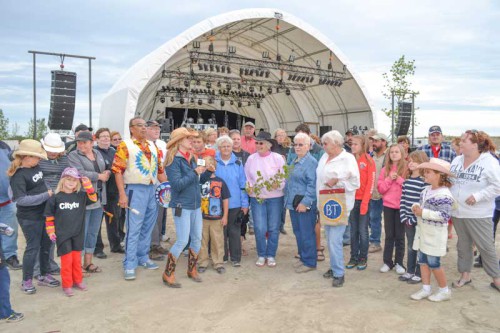To the Expositor:
It is interesting of Shelley Pearen to choose the historical “sesquicentennial” anniversary of the fraudulent treaty of 1862 as the first in a series entitled, “Neighbours for 150 years: (September 12, page 1). While the sentiment for good neighbourly relations is appreciated, I think the emerging consciousness of the Ahnishnabek is based on a more impartial view of historical realities. I see the events of 1862 as a scheme cooked up by irresponsible government officials, whose chief objective was to swindle the native people out of their sacred inheritance. We, in Wikwemikong have lived with the legacy of that fraud and abuse to this day.
Our inheritance was supposed to be protected by an honourable Crown trust, established directly with the Ahnishnabek and other First Nations through a solemn treaty relationship. That commitment was recorded and symbolized by both parties under the Indigenous legal tradition used by the first British Superintendent of Indian Affairs, Sir William Johnson, by his presentation of wampum belts at Niagara in 1764. That treaty not only formalized relations between sovereign entities, but committed the British Crown to protect the interests of First Nations by assuring that only the Crown could acquire the inherent aboriginal interests of the First Nations in lands and resources through consensual treaty agreements. This principal had been enshrined in Canadian law the year before the Treaty by the Proclamation of 1763, which is remains a part of Canada’s Constitutional foundation.
The explicit promise of protection which the Ahnishnabek relied upon was grossly violated by government officials at Manitowaning in October of 1862, when subterfuge and bullying were employed to force an agreement on a minority of the Ahnishnabek population. This might only have been seen as indecent of Crown representatives had not the process been contrary to the prevailing regulations governing “Indian Treaties” at the time. These regulations required majority consent to any surrender, which clearly was not the case in 1862. These legal guidelines were established by Parliament to fulfill not only the very requirements established by the Royal Proclamation of 1763, but more importantly the sacred treaty commitments made to First Nations at Niagara in 1764.
The common law of this country to this day recognizes that the honour of the Crown must always be upheld. It is important to recognize that this 1764 Treaty played a key role in the peaceful founding of Canada, as it bought peace with the First Nations at a time when we threatened the extension British colonialism in North America. From that time on the Anishnaabeg considered the British Crown an ally, fighting in numerous wars on behalf of an ally that did not even consider First Nation peoples citizens of Canada until 1961. The Niagara Treaty also obliged Ahnishnabek warriors to distinguish themselves throughout the War of 1812, as commemorated in current celebrations of that bicentennial. The understanding established in 1764 Treaty also has a direct connection to Manitoulin and the islands across the North Shore of Lake Huron.
The Treaty of Niagara was continually reaffirmed with the formal ritual of the “distribution of presents,” an annual event conducted for nearly one hundred years after 1764. The annual reaffirmation of the alliance of the First Nations with the British Crown had been a priority for the Indian department because it was expected by the First Nations. In August of 1836 the annual distribution was conducted for the first time by the newly appointed Lieutenant Governor, Sir Francis Bond Head at Manitowaning. At that time he proposed an agreement to the Ottawa and Chippewa Ahnishnabek Nations that invoked the very alliance begun with the Treaty of Niagara that was being commemorated by the formal distribution of presents. His written version of the proposal began with “Seventy snow seasons ago we gathered at the Crooked place…,” a direct reference to the Niagara wampum belts that had been presented the day before reminding Bond Head of the First Nation understanding of these annual ceremonies.
The English words of the rest of the written version of the 1836 proposal hardly matter to the Ahnishnabek beyond the reaffirmation of their ownership of the islands. I don’t believe any translation into the Ahnishnabek language could have conveyed in any sense an agreement to surrender land as most later petitions from the Island Ahnishnabek clearly demonstrate that the 1836 agreement was not seen as a surrender, but a reaffirmation of their ownership in the face of encroaching settlement, consistent with the annual renewal of that very principle.
Although the British common law system was alien to First Nations, we have learned to appreciate its drive to fulfill the principles of natural justice, which have come to prevail in international law and relations. The problem with common law is that justice often comes down to access to the courts for a fair hearing, which has proven difficult for First Nations to secure legal counsel as it was prohibited under the Indian Act until 1951.
Wikwemikong has never forgotten the commitments made by the Crown that these islands were to remain our property, a solemn commitment that was broken by misguided colonial officials in 1862 who would not take no for an answer. First Nations have few options but rely on the common law principle established in Canada that where there is a dispute between First Nations and the Crown over a treaty or agreement, the First Nation understanding must be favoured by the courts, as they did not read or write the language of the written documents of the time.
Let us hope that Shelley Pearon’s new book will reveal the Ahnishnabek understanding, which caused so much controversy in the years following 1862, as Wikwemikong resisted the implementation of an illegal treaty. Such understanding would go a long way toward bridging underlying gaps in the understanding of neighbours who all want to coexist on these sacred islands long into the future. I know that we in Wikwemikong have never surrendered our homeland and we only seek a fair resolution that will enable us to maintain the livelihood our forefathers intended. In these uncertain times, such recognition would benefit all Islanders alike.
Rolland Pangowish
Wikwemikong





